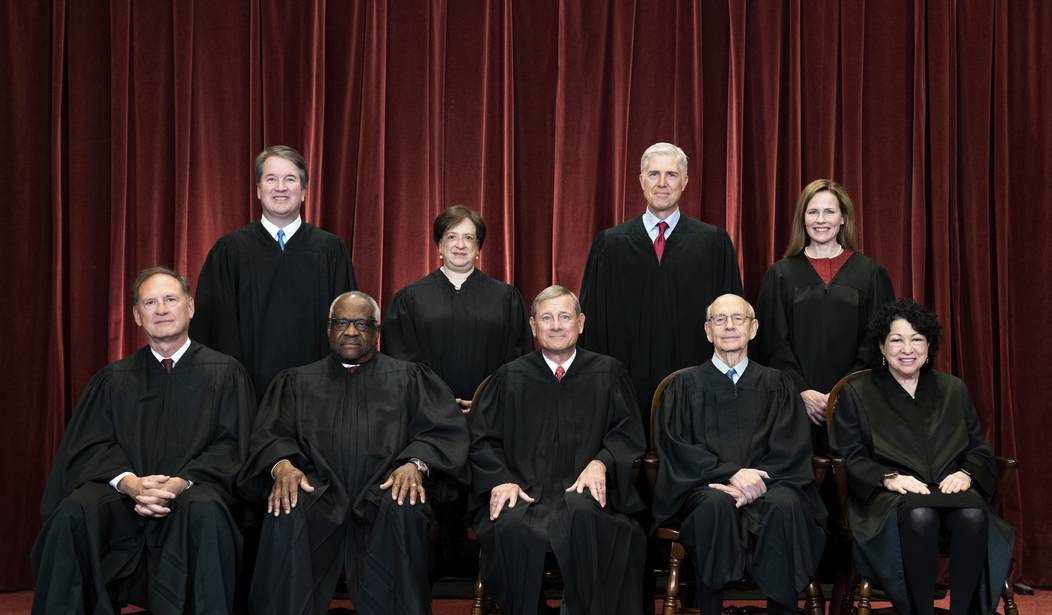The good news for the pro-life movement: The Supreme Court didn’t issue a temporary injunction suspending Texas’ abortion law. The law remains in effect, subject to other rulings, such as the decision made late yesterday in a Texas district court that enjoins its civil-court enforcement provisions.
The bad news for the pro-life movement is that the court enabled federal lawsuits that will likely result in injunctions:
The Supreme Court ruled Friday that a lawsuit by abortion providers challenging Texas’ near-total ban on the procedure can move forward, a victory for opponents of the law.
The measure, the most restrictive in the nation, prohibits abortions in the state after about the sixth week of pregnancy, before many women know they are pregnant.
Texas had sought to make the law nearly impossible to attack in federal court. Because past Supreme Court rulings have said states cannot prohibit abortion before the age of fetal viability, at around 24 weeks, Texas officials didn’t seek to enforce the ban themselves. Instead, the law delegates enforcement to anyone who chooses to sue a doctor performing an abortion or people aiding in the procedure.
The Associated Press finds this a bit confusing, as will many after this odd dance:
The outcome is at best only a partial victory for abortion providers. The same federal judge who already has once blocked the law almost certainly will be asked to do so again. But then his decision will be reviewed by the 5th U.S. Circuit Court of Appeals, which has twice voted to allow enforcement of the abortion ban.
The case could return to the justices and so far there have not been five votes on the nine-member court to put the law on hold while the legal fight plays out. …
The case raised a complex set of issues about who, if anyone, can sue over the law in federal court, the typical route for challenges to abortion restrictions. Indeed, federal courts routinely put a hold on similar laws, which rely on traditional enforcement by state and local authorities.
Another issue is whom to target with a court order that ostensibly tries to block the law. Under Supreme Court precedents, it’s not clear whether a federal court can restrain the actions of state court judges who would hear lawsuits filed against abortion providers, court clerks who would be charged with accepting the filings or anyone who might some day want to file a lawsuit.
The Texas law was specifically designed to put obstacles in the way of legal challenges, and so far it has worked.
Isn’t this just another punt? A lengthy decision on this point and a series of concurrences and dissents seem to land on that square. The court has produced a lengthy discourse on technicalities, properly so based on their position as being in an “interlocutory” phase rather than a trial on the merits. Justice Neil Gorsuch addresses the one point on which they all agree:
While this interlocutory appeal focuses primarily on the Texas official defendants’ motion to dismiss on grounds of sovereign immunity and justiciability, before we granted certiorari the Fifth Circuit also agreed to take up an appeal by the sole private defendant, Mr. Dickson. In the briefing before us, no one contests this decision. In his appeal, Mr. Dickson argues that the petitioners lack standing to sue him because he possesses no intention to file an S. B. 8 suit against them. Mr. Dickson has supplied sworn declarations so attesting. See, e.g., Brief for Respondent Dickson 32. The petitioners do not contest this testimony or ask us to disregard it. Accordingly, on the record before us the petitioners cannot establish “personal injury fairly traceable to [Mr. Dickson’s] allegedly unlawful conduct.” California v. Texas, 593 U. S., at ___ (slip op., at 9) (internal quotation marks omitted). No Member of the Court disagrees with this resolution of the claims against Mr. Dickson.
This, however, seems pretty important to what happens next. Even with all of the disputes over the technicalities, eight of the nine justices see the federal courts as a legitimate arbiter to this dispute no matter how Texas structured its law. Stick around for Gorsuch’s rebuke of Justice Sonia Sotomayor:
The truth is, many paths exist to vindicate the supremacy of federal law in this area. Even aside from the fact that eight Members of the Court agree sovereign immunity does not bar the petitioners from bringing this pre-enforcement challenge in federal court, everyone acknowledges that other pre-enforcement challenges may be possible in state court as well.5 In fact, 14 such state-court cases already seek to vindicate both federal and state constitutional claims against S. B. 8—and they have met with some success at the summary judgment stage. See supra, at 2. Separately, any individual sued under S. B. 8 may pursue state and federal constitutional arguments in his or her defense. See n. 1, supra. Still further viable avenues to contest the law’s compliance with the Federal Constitution also may be possible; we do not prejudge the possibility. Given all this, JUSTICE SOTOMAYOR’S suggestion that the Court’s ruling somehow “clears the way” for the “nullification” of federal law along the lines of what happened in the Jim Crow South not only wildly mischaracterizes the impact of today’s decision, it cheapens the gravity of past wrongs.
Clarence Thomas would have dismissed all the pre-enforcement lawsuits, while Roberts argues that they are indeed legitimate. Most of this, however, ends up being window dressing to the overall outcome, which is to leave the Texas law in place. The Supreme Court does not want to carve out a precedent where they can effectively block actions in state courts to docket lawsuits, which is what the petitioners demanded.
That certainly doesn’t answer the question of the constitutionality of the law itself. When paired with the green light for pre-enforcement lawsuits on the merits (as opposed to requests for injunctions) and Judge Peeples’ decision yesterday in Texas, the lawsuits are likely effectively on hold anyway, even if abortion providers still face potentially massive liabilities if they continue to operate. This decision freezes the status quo until the court rules on Dobbs, and one has to believe that this outcome is precisely what the majority wanted.








Join the conversation as a VIP Member